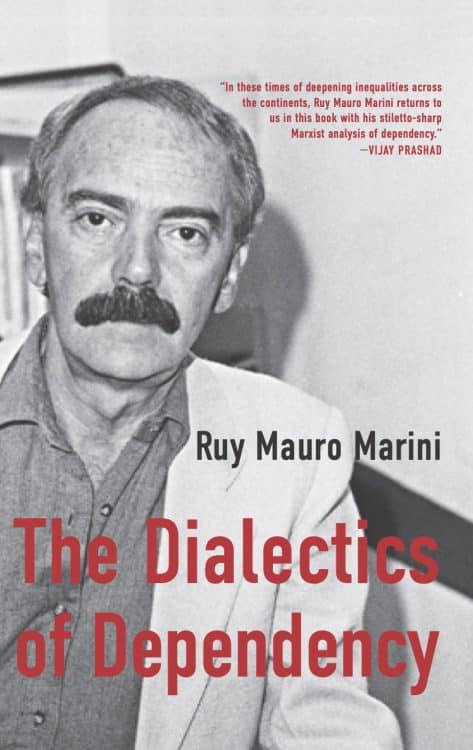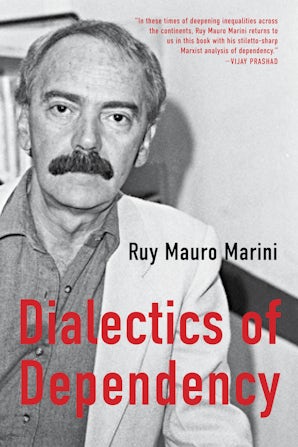A slim book with profound impact (The Dialectics of Dependency reviewed in ‘Marx & Philosophy Review of Books’)
The Dialectics of Dependency
By Ruy Mauro Marini
Amanda Latimer and Jaime Osorio (eds.), Amanda Latimer (trans.)
228 pages / $26 paper / 9781583679821
Reviewed by Bill Jefferies
Ruy Mauro Marini’s classic The Dialectics of Dependency is available in English for the first time in a translation by Amanda Latimer. Latimer’s translation, and the collection of pieces in it, was the winner of the Paul A. Baran and Paul M. Sweezy Memorial Prize. It consists of a contextual essay by Latimer, an introduction and afterword by Jaime Osorio, The Dialectics of Dependency itself and a post-script partly written in response to the critique of former Brazilian President Fernando Cardoso. The impact of this slim book was profound, and Latimer’s essay goes a long way to explaining both its rationale and why it caused such a stir upon publication in the early 1970s. It is part of a revival of Latin American Marxism to overcome what could have once been described as the Marxism in exile of Marini, Theotônio dos Santos, Vânia Bambirra and to a lesser extent, André Gunder Frank, including the online publication of Marini’s writings under the direction of Jamie Osorio.
Dependency theory emerged in the 1960s and 1970s to explain the development of Latin America in its dependent relationship with advanced capitalist economies, the US in particular. It served a practical purpose of orienting Latin American Marxists in the revolutionary struggles of that period, following the inspiration of the Cuban revolution and the crises across the region in Mexico, Brazil, Argentina and Chile, amongst others.
It rejected the notion that these economies could usefully be described as semi-feudal (as the official Communist parties proposed with the obvious implication of a democratic capitalist stage in the revolution) or ‘precapitalist’ (114), but rather sought to explain the stunted, limited and servile developed/underdeveloped nature of capitalism, and the interest of domestic capitalists in reproducing this regime, through the framework of Marx’s law of value, which ‘only makes sense if we examine it from the perspective of the system as a whole, both at the national and, mainly, at the international level’ (114).
Marini observed that Latin America ‘developed in close consonance with the dynamics of international capital’ (116). Its relations with European capitalist centres took place within a defined structure of an international division of labour, such that ‘dependency takes shape, understood as a relation of subordination between formally independent nations, in the framework of which the relations of production of the subordinate nations are modified or re-created to ensure the expanded reproduction of dependency’ (117). Herein lay the weakness of Frank, the failure to adequately differentiate dependent from colonial development. Latin America supplied the agricultural products, food and raw materials to fuel European industrialisation. Developed capitalist nations increased relative surplus value by raising productivity and so reducing the value of wage goods. With their higher organic composition of capital, rising productivity was predicated upon an increase in the supply of raw materials and ‘an increase in the productive capacity of labor implies a more than proportional increase in the consumption of raw materials’ (123). Hence the value composition of capital rises as the proportion necessary for variable capital falls, and as the value of constant capital employed rises, so the rate of profit falls (124). As prices of production modify values such that those firms and nations with a higher concentration of capital receive transfers of value from less concentrated, lower organic firms/economies and as domestic capitalists sell their output abroad and so are less concerned with the growth of the domestic market, so unequal exchange, expressed in poor terms of trade, provides a mechanism through which capitalist development produces underdevelopment or dependency. The relative price of the agricultural products declined compared with manufactured goods, not due to productivity changes, as productivity increased faster in manufacturing rather than agriculture (125), but rather as rising productivity was rewarded with higher profits, a transfer of surplus value from the underdeveloped to the developed nations (127-128). Nations disadvantaged by this unequal exchange correct the imbalance through exploiting their domestic working classes more intensively (129). Capital accumulation produces underdevelopment or a subordinate dependent relationship between nations. The export of surplus value through unequal exchange denies the profits necessary for domestic accumulation and means the dependent capitalists seek to compensate for the lack of profits through squeezing wages below the cost of reproduction of labour power, increasing the intensity of labour and extending the working day (131). Hence dependent development/underdevelopment produces absolute rather than relative surplus value, squeezing domestic demand which is compensated for by exports (137), thus separating the production and circulation of commodities. The Latin American export economy is ‘more than a mere product of an international economy based on productive specialization: it is a social formation based on the capitalist mode of production, which accentuates the contradictions inherent to capitalism to the limit’ (139). Latin American industrialisation does not create its own demand but rather ‘is born to meet a pre-existing demand […] structured according to the market requirements emanating from the advanced countries’ (145). Technological development and industrialisation, where they occur, are also shaped by this fundamental structure wherein the productive apparatus is divorced ‘from the consumption needs of the masses’ (152).
Marini’s postscript emphasises his assumption that the ‘export economy constitutes the transitional stage to an authentic national capitalist economy, which only takes shape when the industrial economy emerges there’ (155). At the outset the dependent economy is shaped by the industrial one. Only when it becomes its own genuine centre of capital accumulation does ‘the dependent economy cease to correspond primarily to problems of realization of the industrial nations to which it is subordinated’ (157). Hence, and in contradiction to Cardoso, the super exploitation of the dependent nation is a ‘necessary condition for world capitalism’ (160). The purpose of Marxist critique of political economy was to determine the ‘specific laws’ that governed dependency.
Latimer’s introduction leans on Marini’s own 1990 autobiographical memoir. Marini’s life as a theoretician in exile began with the Brazilian military coup of 1964, but encompassed many of the key events of that period, including Salvadore Allende’s Unidad Popular, overthrown in 1973 in the US backed coup, and included engagement with the United Nations Economic Commission on Latin America CEPAL and Cardoso’s structuralism. At twenty-one, Marini entered the law faculty at the University of Brazil and came under the influence of sociologist Alberto Ramos. Ramos had previously urged the liberation of the bourgeoisie from its ‘semi-colonial and underdeveloped mentality’ (31) and with Ramos’ encouragement, Marini transferred to Paris in 1958 where, inspired by exiles from French anti-colonial struggles, he concluded that the theories of development so ‘in vogue’ were in fact instruments for ‘the mystification and domestication’ (32) of the oppressed peoples of the Third World in their struggled for decolonization from imperialism.
Marini returned to Brazil in 1960 as a journalist for Cuba’s press agency Prensa Latina and then as an associate professor at the University of Brasilia alongside Frank, dos Santos and Bambirra, the ‘polemical trio’ from whence dependency theory originated. This development was stimulated by the debates in the Brazilian left and formation of POLOP, which criticised the class collaborationist strategy of the Brazilian Communist Party, advocating a socialist revolution as a solution to Brazilian capitalism. The military coup of April 1 1964 forced Marini to flee and arrested twice and tortured, he went underground, with the materials for his PhD thesis on Brazilian authoritarianism destroyed, and was granted asylum in Mexico. He eventually joined the Centre for Latin American Studies with whom he would be associated for the rest of his life.
Marini developed the term sub-imperialism, the ‘form that dependent capitalism assumes upon reaching the stage of monopolies and finance capital’ (44). The term sought to counter the prevailing orthodoxy that excused or absolved the culpability of Brazilian capitalists for the military dictatorship. Brazilian capitalists had been integrated with and subordinated to US imperialism during the postwar period through ‘antagonistic cooperation’ (45), through a combination of trade and foreign direct investment, while the limited scale of the domestic market increased their dependence on sales to the US. These writings were widely translated but banned in Brazil.
Marini actively participated in the period of student and worker revolt that led to the October 2 1968 Mexican military repression and massacre at the Plaza de las Tres Culturas. Marini was forced into exile again, this time to Chile, where he began work at the University of Conception, joined the Revolutionary Left Movement (MIR) and then relocated to the Centre of Socio Economic Studies (CESO) at the University of Chile in 1970. Once again he began work with fellow exiles dos Santos, Bambirra and Frank amongst others. According to Bambirra, the work at CESO was the ‘most consistent effort to develop a “Marxist theory of dependency”’ (59). It influenced the Unidad Popular but led to the political separation of dos Santos, Bambirra, who joined the UP, and Marini, who maintained support for the MIR and the perspective of social revolution.
Marini’s Dialectia de la Dependencia began as a set of notes, ‘the red book’ or folder more accurately, in 1966. The first draft was destroyed in the ‘genocidal and incendiary fury’ of a military raid on the day of the coup, September 11 1973, and incomplete versions appeared before its final publication in Subdesarrollo y Revolucion in 1974. Marini criticised the notion that Third World social formations were ‘precapitalist’ rather specific developments of capitalism which was the result of a ‘tight consonance’ with European capitalism, contrasting the relations of dependency with that of the colonial or mercantile system, insisting that ‘underdevelopment is the other face of development’ (65). Cardoso polemicised against early versions of Marini’s article in 1972 and again with Jose Serra in 1978, proposing rather a tripartite structure of state enterprises, multinational corporations and local businesses that enabled the local bourgeoisie to accumulate capital and so escape dependency. Cardoso and Serra sought to demonstrate that the domestic market was adequate for domestic capitalists to realise their output, downplayed the super exploitation of the working class and pointed to domestic technological advance as a mechanism to increase relative surplus value, allowing the development of domestic industrialisation. Marini defended his analysis by explaining that actual development did not necessarily comply with the universal notions of an abstract capitalism, but rather had to be studied as they actually existed. Marini condemned Cardoso as an apologist for the dictatorship, who conflated violent military accumulation with a bourgeois revolution. Cardoso went on to become President between 1994 and 2002, while Serra entered the Cabinet. Notwithstanding their ability to turn words into practice, Brazil remains an underdeveloped country, fatally dependent on the export of raw materials, with rampant income inequality and a limited domestic market.
Marini escaped Chile to Germany and then Mexico, continued to work for the MIR and argued against the concept of ‘military fascism’ with its implication of the necessity to establish a broad front with the bourgeoisie to campaign for the restoration of democracy. Marini’s theoretical focus concentrated on how the circuit of capital accumulation was distorted in dependent capitalism, through the super exploitation of the working class, limiting the domestic market and leading to the expansion of the luxury goods sector, the export of output and extraordinary profits abroad.
Marini returned to a changed Brazil in 1984 as intellectuals sought to accommodate themselves to the new neoliberal order, turning away from the masses to European social democracy and US-based research foundations. Not Marini. Eventually he secured a post at the University of Brasilia, investigating Brazil’s manufacturing sectors fostered by dictatorship subsidies, the wage squeeze and income inequality. He continued to write about social class before returning to Mexico in 1993. He unapologetically defended dependency theory even in the very different circumstances confronting him.
Find the review at Marx & Philosophy Review of Books


